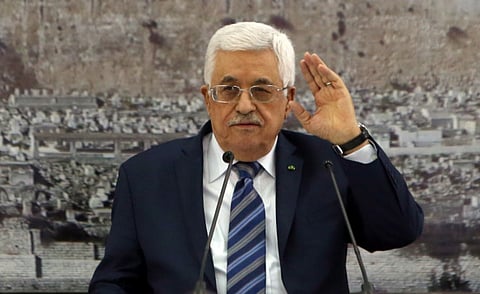Palestinian leadership must reevaluate liberation strategy
It is past time for the Palestinian leadership to reevaluate liberation strategy

This week marks the 10th anniversary of the death of Palestinian leader Yasser Arafat. Through his unwavering commitment to Palestinian liberty and his demand that Palestinians represent themselves, rather than be represented by others, Arafat delivered Palestinians, and our cause, from the verge of national extinction to the forefront of the world’s attention. In short, Arafat was unwilling to allow the world to forget the ethnic cleansing of Palestinians by the Zionists. This is not to say that Arafat was a perfect leader — he was not. He was the leader who had signed the disastrous Oslo Accords and led Palestinians down a path of perpetual dependence upon international donors and willingness to indulge in endless rounds of fruitless negotiations.
But ten years after his passing away, it is clear that Arafat was not the obstacle to peace, as alleged by Israel and backed by the US. It is Israel’s insatiable appetite for Palestinian land and its desire to keep Palestinians in perpetual subservience that have rendered peace impossible.
This this is not to argue that the current Palestinian leadership should be absolved of any responsibility for the worsening conditions of Palestinians. Take, for example, the ongoing Fatah-Hamas division. While all Palestinian factions are acutely aware that such division only serves Israel’s interests, this current leadership — guided more by international diktats than domestic concerns — continues to perpetuate and exacerbate this split. The result has been to destroy Palestinian democracy — the very backbone of the Palestinian struggle for self-determination. Instead, Palestinians are plagued with a leadership, both presidential and parliamentary, that is currently in its third term despite having only been elected for one. This parliament that has not convened for more than seven years and the prime minister serve without the requisite parliamentary confirmation, passing laws instead by presidential decree. The record of Hamas in the Gaza Strip is no less abominable.
Take also the latest breakdown of so-called negotiations in April this year. Despite a proven 21-year track record of failure, the current Palestinian leadership continues to cling to negotiations, in the evidently naive belief that negotiations will lead to Palestinian liberation. On the contrary, these negotiations and other diplomatic efforts have only served to cement Israel’s control over Palestine and Palestinians with a tripling in the number of Israeli colonists living illegally in the West Bank since the start of the negotiations charade. Just this week, the Israeli authorities announced that they would further expand the ever-expanding colonies by adding more than 1,200 new housing units.
Palestinians today live surrounded by Israeli-only colonies, behind hundreds of Israeli-manned checkpoints and its grotesque and illegal wall and are forced to apply for Israeli “permission” to travel within their own country — whether to visit occupied Jerusalem, Gaza or Nazareth. Palestinians in Gaza are still suffering the after-effects of a 50-day massive assault — in which Israel destroyed more than 20,000 homes and attacked hospitals, schools and mosques — while continuing to live under a brutal siege. And, while Israeli right-wing groups, fully backed by their fascist government, threaten to take over Al Haram Al Sharif, the Palestinian leadership inexplicably continues to laud security cooperation with Israel as “sacred”.
All of this signals the need for a change in direction and a shift away from the perpetual process of negotiations, the continued lack of democracy and security cooperation with Israel in favour of support for popular Palestinian boycotts and civil disobedience and Israel’s isolation and exclusion from the international arena while also holding Tel Aviv accountable for its continued crimes. Rather than negotiating with an occupier and ethnic cleanser that has already shown that it is not interested in peace, the Palestinian leadership should be following the lead of Palestinian civil society and urging the world to boycott and sanction Israel. Rather than deepening the lack of democracy in Palestine and for Palestinians, this leadership should be pushing for and organising representative elections for all Palestinians, irrespective of where they live.
Finally, rather than continue security cooperation (a euphemism for being Israel’s security subcontractor), the current Palestinian leadership should turn its focus towards protecting Palestinians from Israel’s ongoing attacks. The time has come for a change of strategy — a shift away from closed-door negotiations to popular, nonviolent resistance that empowers Palestinians to achieve independence rather than perpetuating and deepening dependence on the goodwill of an ethnic cleanser (and its US backer), which has no intention of freeing Palestinians from its rule.
Israel, long ago, smacked the olive branch out of our hands. It is past time for the Palestinian leadership to harness our resilience and reevaluate our liberation strategy.
Diana Buttu is a Ramallah-based analyst, former adviser to Palestine Liberation Organisation chairman Mahmoud Abbas and Palestinian negotiators and policy adviser to Al Shabaka: The Palestinian Policy Network.
Sign up for the Daily Briefing
Get the latest news and updates straight to your inbox



